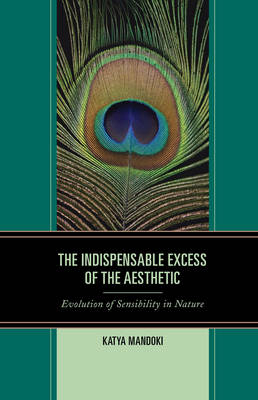
The Indispensable Excess of the Aesthetic
Evolution of Sensibility in Nature
Seiten
2015
Lexington Books (Verlag)
978-1-4985-0306-8 (ISBN)
Lexington Books (Verlag)
978-1-4985-0306-8 (ISBN)
This book offers a compelling account of the evolution of sensibility, weaving together Darwinian and biosemiotic theory. It works along non-anthropomorphic aesthetics of the appreciation and creation of beauty in nature as an end in itself which has practical benefit.
The Indispensable Excess of the Aesthetic: Evolution of Sensibility in Nature traces the evolution of sensibility from the most primal indications detectable at the level of cellular receptors and plant tendril sensitivity, animal creativity and play to cultural ramifications. Taking on Darwin’s insistence against Wallace that animals do have a sense of beauty, and on recent evolutionary observations, this book compellingly argues that sensibility is a biological faculty that emerges together with life. It argues that there is appreciation and discernment of quality, order, and meaning by organisms in various species determined by their morphological adaptations and environmental conditions. Drawing upon Baumgarten’s foundational definition of aesthetics as scientia cognitionis sensitivae, this book proposes a non-anthropocentric approach to aesthetics as well as the use of empirical evidence to sustain its claims updating aesthetic understanding with contemporary biosemiotic and evolutionary theory. The text leads us along three distinct but entwined areas: from the world of matter to that of living matter to the realm of cultivated living matter for exploring how and why sensibility could have evolved. It points out that aspects traditionally used to demarcate and characterize human aesthetics—such as appreciation of symmetry, proportion and color, as well as pleasure, valuation and empathy, sensory seduction, creativity, and skills for representation, even fiction—are present not only in humans but among a variety of plant and animal species.
The Indispensable Excess of the Aesthetic: Evolution of Sensibility in Nature traces the evolution of sensibility from the most primal indications detectable at the level of cellular receptors and plant tendril sensitivity, animal creativity and play to cultural ramifications. Taking on Darwin’s insistence against Wallace that animals do have a sense of beauty, and on recent evolutionary observations, this book compellingly argues that sensibility is a biological faculty that emerges together with life. It argues that there is appreciation and discernment of quality, order, and meaning by organisms in various species determined by their morphological adaptations and environmental conditions. Drawing upon Baumgarten’s foundational definition of aesthetics as scientia cognitionis sensitivae, this book proposes a non-anthropocentric approach to aesthetics as well as the use of empirical evidence to sustain its claims updating aesthetic understanding with contemporary biosemiotic and evolutionary theory. The text leads us along three distinct but entwined areas: from the world of matter to that of living matter to the realm of cultivated living matter for exploring how and why sensibility could have evolved. It points out that aspects traditionally used to demarcate and characterize human aesthetics—such as appreciation of symmetry, proportion and color, as well as pleasure, valuation and empathy, sensory seduction, creativity, and skills for representation, even fiction—are present not only in humans but among a variety of plant and animal species.
Katya Mandoki teaches aesthetics and semiotics at the Autonomous Metropolitan University.
Chapter 1: Aesthesis
Chapter 2: Orbis Primus
Chapter 3: Orbis Secundus
Chapter 4: Orbis Tertius
Chapter 5: Excess
| Verlagsort | Lanham, MD |
|---|---|
| Sprache | englisch |
| Maße | 161 x 236 mm |
| Gewicht | 513 g |
| Themenwelt | Geisteswissenschaften ► Philosophie ► Philosophie der Neuzeit |
| Naturwissenschaften ► Biologie ► Evolution | |
| ISBN-10 | 1-4985-0306-3 / 1498503063 |
| ISBN-13 | 978-1-4985-0306-8 / 9781498503068 |
| Zustand | Neuware |
| Haben Sie eine Frage zum Produkt? |
Mehr entdecken
aus dem Bereich
aus dem Bereich


